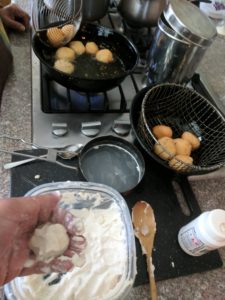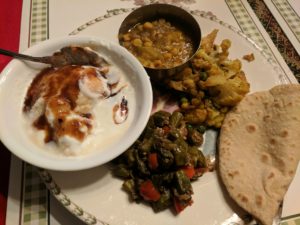By Arun Gupta (June 14, 2018)
After immersing myself in Bourdain’s work for days — his books, interviews, hundreds of articles, a dozen shows — I did some cooking with my mom.
Bourdain is right that the best food is to be found within the home. The most elaborate, artistic, and expensive, is in restaurants, but the food there is more an exercise in the purity of science, commerce, and aesthetics than human connection.
When I make food with my mom, every ingredient, technique, and dish comes with a detailed back story: where the food was grown, the types of markets and shops they purchased the ingredients from, how her mother taught her to make them, how they were prepared in the home, and the rituals as to how they were eaten and food was shared, many decades ago.
None of that is present with restaurant food, no matter how sublime. It is a commodity severed from the social relations that make us human.The simplest of foods can connect us to where we came from and who we are. When shared, the food allows others to experience a different culture sensually and it is the gateway to conversations about everything that makes that culture distinct and what we share in common.
One dish I recently learned to make is bhalla, which is almost exactly the same as vada in South India.
First we made a batter of split urad dal that had been soaked in water until it was soft (about 6 hours) and then ground into a thick batter.I whipped air into it. Then wetting my hand, I made small balls.
That’s the master chef at work deep frying the balls.

We ate it two different ways. One is with sambar, the South Indian spicy dal and vegetable stew. In South India, the batter has psices added to it and is made into a donut shape before being fried.
The second way is to eat it in yogurt. To prepare, the cooled, fried bhalla are soaked in warm water for 30 minutes. They are gently squeezed and flattened, which removes much of the oil. Homemade yogurt that has been whipped with salt is spooned over the balls. It is finished with imli (tamarind) chutney and garam masala. All homemade, of course.
We don’t live in a society that gives people the time, the means, the social stability to learn and transmit knowledge. Neither is ours a society which respects communal ways of living or culture expression outside the market.
In a world where we are nothing but commodities — our labor, ideas, and bodies exist for profit — then the same is true of how we reproduce ourselves. Everything we need in our daily lives exists as a product to be brought and sold, not as an expression of our humanity.

Having a culturally rich, diverse, and healthy food system has little to do with individual choice for most people.
It is the conditions that determine what’s on our plates. It’s not what’s on our plates that determine our conditions.

(Photos by Arun Gupta)

